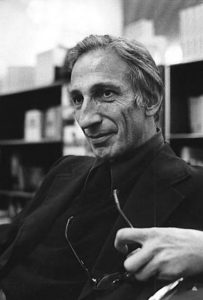David Cayley is a Canadian writer and broadcast journalist who has made a career interviewing and explaining notable Christian intellectuals, including Marshall McLuhan, Northrop Frye, George Grant and Rene Girard.
In his new book “Ivan Illich: An Intellectual Journey” (Penn State University Press, $42.75), Cayley offers us the fruits of his 32-year relationship with Illich as his friend and student.
Ivan Illich (not to be confused with Tolstoy’s famous character of a very similar name) was a one time Catholic priest and controversial social theorist in the ’60s and ’70s, whose radical ideas are only now beginning to receive their due.
A historian of the Middle Ages, Illich saw the institutions of the modern world largely growing out of the early and medieval Roman Catholic Church. But over time this process distorted and corrupted the original teachings and inverted the virtues and values of Christ, transforming hospitality into hospitals, know-how into schooling, health care into a commodity, and death into a disease.

As a consequence, modern men and women have made impressive demographic advances in terms of life spans and mortality rates, but lost their self-sufficiency, personal integrity, and religious faith.
These, Illich theorized, have been replaced by economic dependence, collective thinking, and a distorted sense of personal entitlement, making good on Chesterton’s witticism: “We live in a time when it is harder for a free man to make a home than it was for a medieval ascetic to do without one.”
It may sound like a pretty outrageous assessment — until we listen with care to what Illich actually meant by these charges. Dismissed as an anarchist by the liberal left and falsely appropriated by the extreme right, Illich saw himself as bringing the good news of the gospel to bear on the many crises afflicting our institutions, from church to school to government.
For him, the way forward was backward, back to the original virtues that predated modernity and shaped and defined both classical civilization and the Medieval Synthesis.
Cayley’s serious dive into Illich’s life as a cultural critic and social activist is a deep one — 560 pages deep, to be precise. For Cayley, who posthumously published a series of interviews conducted late in Illich’s life in 2005, it is the latest valuable contribution to a figure whose radical ideas were not fairly understood the first time around.
We now can see the Christian sources of Illich’s views. Not to mention that much of what Illich warned us about has come true — including our increasing inability to fathom what has happened to us!
Take Illich’s most infamous book “De-Schooling Society” (1971). As absurd as that title may (still) sound to those of us who depend upon schools to help raise our children and prepare them for jobs in an increasingly technological and professionalized workplace, public education must take at least some responsibility for our increased dependence on secondhand thinking (aka “the non-thought of received ideas”) that make us so vulnerable to demagogues — including the hustles of robo-calls and the extortions of conspiracy theorists.
Increasingly our authorities are being replaced by social media “influencers,” artists by entertainers, ideas by fads, reflection by distraction, and faith by false optimism.
But Illich wasn’t just saying that standards have dropped or that values have changed. His critique of modernity goes much deeper than that. The way we think and the words we think with have themselves been so corrupted by new disciplines and systems that their common meaning no longer gives us a way out from the ideologies within which they have become embedded. Try to talk to a school superintendent about curriculum or a politician about legislation without using jargon; it’s impossible.

Illich’s motto “the corruption of the best is the worst” applies to the Church as much as it does to any other modern institution. We already see our culture being increasingly “de-churched” — or rather, we see churches being replaced by secular rituals and forms of worship from sporting events to foodie events to celebrity idolatry.
The new form of Christian prophecy Illich declared has migrated to friendship — honesty communicated one to one, heart to heart, friend to friend.
I must admit here that I am not doing justice to Illich as a stylist or to the “sparkle” of his prose, nor to the careful eloquence of Cayley’s analysis. As a friend of Illich, Cayley’s book carries forward and, in many ways, completes the vision Illich had not the time in his relatively short life to fully elaborate and explain.
Born in an Art Deco mansion in Vienna with four different languages as his mother tongue, Illich was exiled from Europe during World War II and wound up in the slums of New York and, later, in collectives in Mexico and Puerto Rico.
Watching him being interviewed by a French journalist on YouTube, Illich comes across as a charming, humble, and self-effacing man. To hear him propose surprisingly radical and liberating ideas made it sometimes hard to believe my own ears.
This is why Cayley’s book is so necessary: It is important for us to know who Illich was and what he truly stood for before his genius is mis-appropriated again by those with a superficial understanding of what he stood for and who did not know him personally.
Former California Governor (and one-time Jesuit seminarian) Jerry Brown described Illich, his friend and adviser, as “not your standard intellectual.”
“His home,” Brown tells us, “was not in the academy and his work forms no part of an approved curriculum. He issued no manifestos and his utterly original writings both confound and clarify as they examine one modern assumption after another. He is radical in the most fundamental sense of the word and therefore not welcome on any reading list.”
Surely David Cayley’s masterful new appreciation will help correct this inhospitality.

